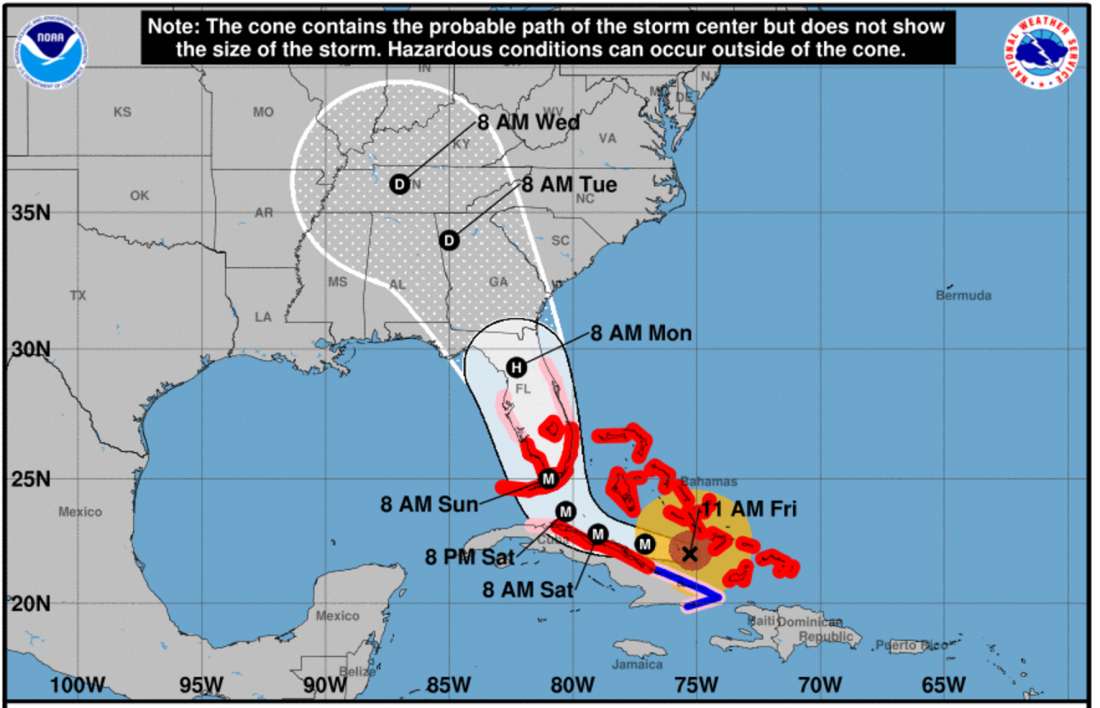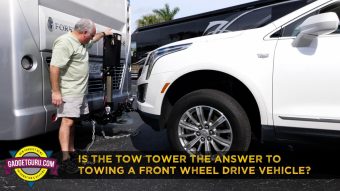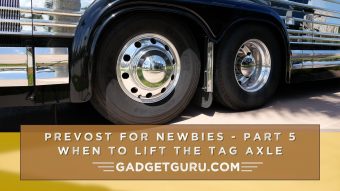Why A Motorhome Makes Sense When You’re In The Path Of A Hurricane
Everyone who owns a motorhome has a friend who asks multiple questions when they learn you’ve just purchased a RV:
What are you going to do with that thing? Where are you going with your motorhome? And most inevitably, What were you thinking?
Yes, our non-motorhoming friends simply may not understand our sense of adventure or the benefit of having a house on wheels that can be relocated on a moment’s notice.
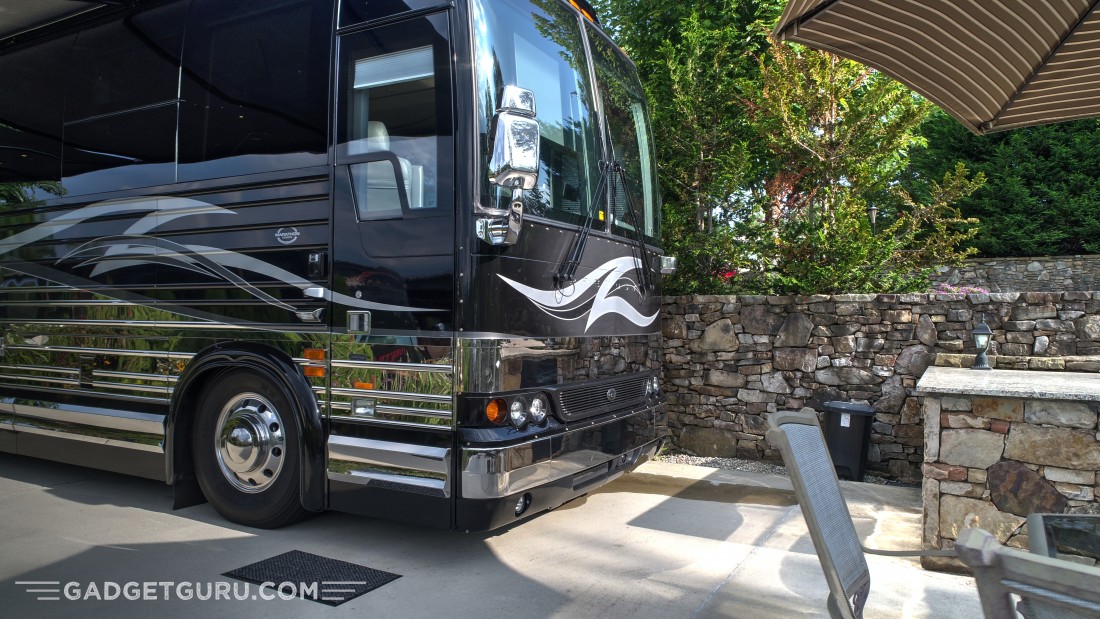
Andy’s Marathon Prevost X3 At Mountain Falls Motorcoach Resort
Having lived in Florida for twenty years, when I purchased my first motorhome, I felt that one of the benefits of ownership was that it would be the ideal mode of comfortable transportation in the case of an evacuation such as the one that Florida and surrounding States are experiencing with Hurricane Irma. Another benefit is having a mode of travel that’s much more luxurious than flying on crowded airlines…but that’s another story for another day.
With a motorhome, you can pack a family with all the necessities, drive out of harm’s way and end up having an adventure that will most likely end up being a wonderful story to tell your non-motorhome owning friends upon your return. But, like anything else, the success of the outcome relies on detailed advance planning. Another benefit is that even if you wait until the last moment to evacuate and find yourself attempting to navigate through gridlocked traffic, having a refrigerator, kitchen and yes, a bathroom will evacuation a somewhat comfortable experience.
Be Prepared
As a Boy Scout, I learned the motto, “Be Prepared” is the key to just about any situation. Whether it studying for a test, packing the necessities for a camping outing or preparing a motorhome for a trip, being prepared is a key element for success. Personally, I like to use checklists and they come in handy for a variety of situations.

The Gadget Guru’s Motorhome Checklist
I have a book I carry on my motorhome with individual pages that outlines the steps I need to go through in preparing my motorhome for various scenarios when arriving or departing a campground with or without hookups or when placing the bus in storage. Yes, with today’s sophisticated motorhomes, whether you’re a seasoned motorhome traveler or a relative newbie such as myself, there’s a lot to remember. I’ve found having custom checklists for various scenarios helpful in remembering the various steps that need to be accomplished when setting up for camping or preparing for travel. Since every situation requires a somewhat different method of preparation, I’ve found having these checklists are the best way of not forgetting to do something that could adversely affect traveling or camping.
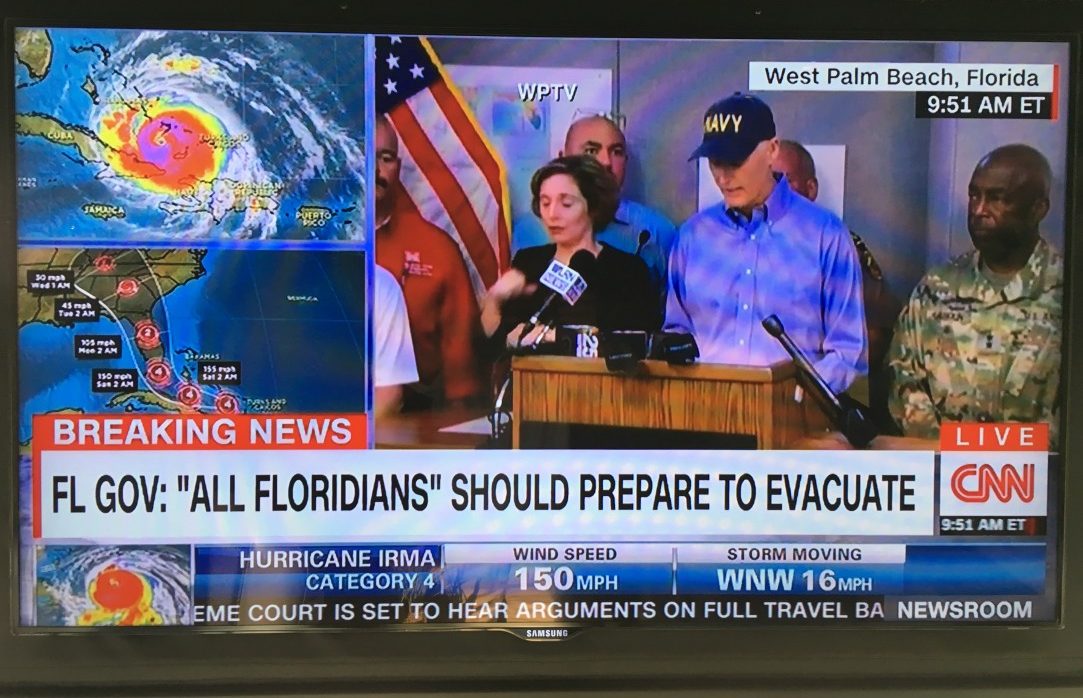
CNN: Florida Governor Rick Scott
This underlines a point of making sure your motorhome is in good working order and not putting service items on the back burner. Because evacuation decisions need to be made quickly, having a bus that is ready to go on short notice is part of the recipe for success. After all, what good is it if you pack the bus, load the family and then turn the key to only to find the engine doesn’t start?
Fuel And Water
While I’ve only owned a motorhome for a year, I’ve gotten into the habit of making sure I arrive at a destination with full tanks of fuel and clean water and empty black and gray tanks. This requires the last stop of a travel day to be at a fuel station and making sure I leave the previous spot with a full tank of water. This way, in the case of a last minute trip or even an emergency evacuation, I have the satisfaction of knowing that I can put some miles behind me without having to worry about finding fuel stations. As we’ve learned, during a time of mass evacuation, long lines and fuel shortages are the norm. Again, be prepared.
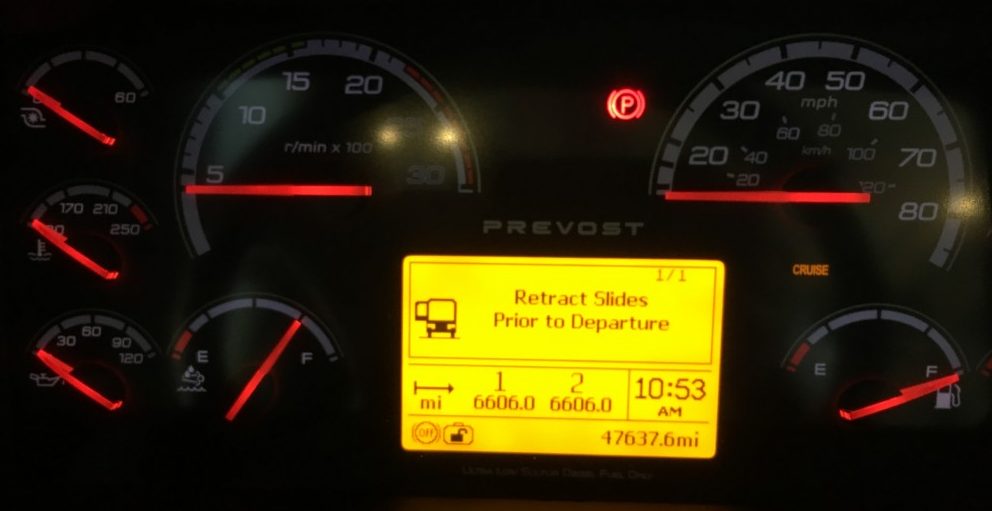
Prevost Dash Cluster
Are Full Tanks Too Much Weight To Carry?
I have no doubt that some motorhome owners will say that traveling with a full tanks can add too much weight to the RV. This is why it’s important to have your coach weighed when the tanks and compartments are full to determine the proper tire air pressures to handle a full load. This method also lets you know how much of a load your RV can safely handle. While I want to stay on topic, here’s a link to a story about having the tires/axles individually weighed to determine the proper air pressure.
Underlining the importance of this “full tank” step, I spoke to a Florida-based motorhome-owning Friend yesterday who was in the midst of planning an evacuation in his bus. However, he realized he had a problem… his bus’s fuel gauge was reading a low level. Due to the mass evacuation that was taking place in Florida, he quickly learned that finding a diesel station that had fuel available or one that didn’t have long lines would be problematic. He’ll be waiting out this storm at home.
Also, having full fuel and water tanks means less air and lower the chance of contamination.
Know Your Generator/Inverter
In an evacuation scenario, there’s a good chance that campgrounds in areas away from the storm’s path may be full and you might find yourself dry camping. It’s important that you know the limitations of your generator and inverter as the last thing you want to deal with is an overload situation that could take away many of the comforts of traveling in a motorhome.
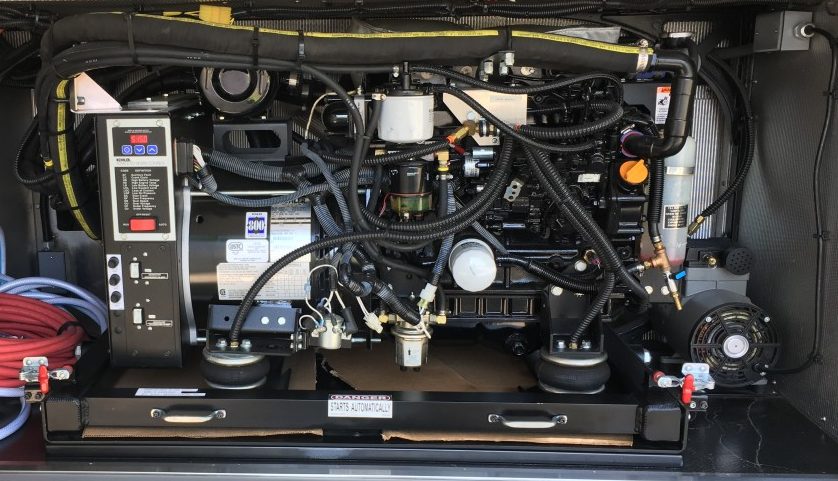
Generator On Andy’s Marathon Prevost
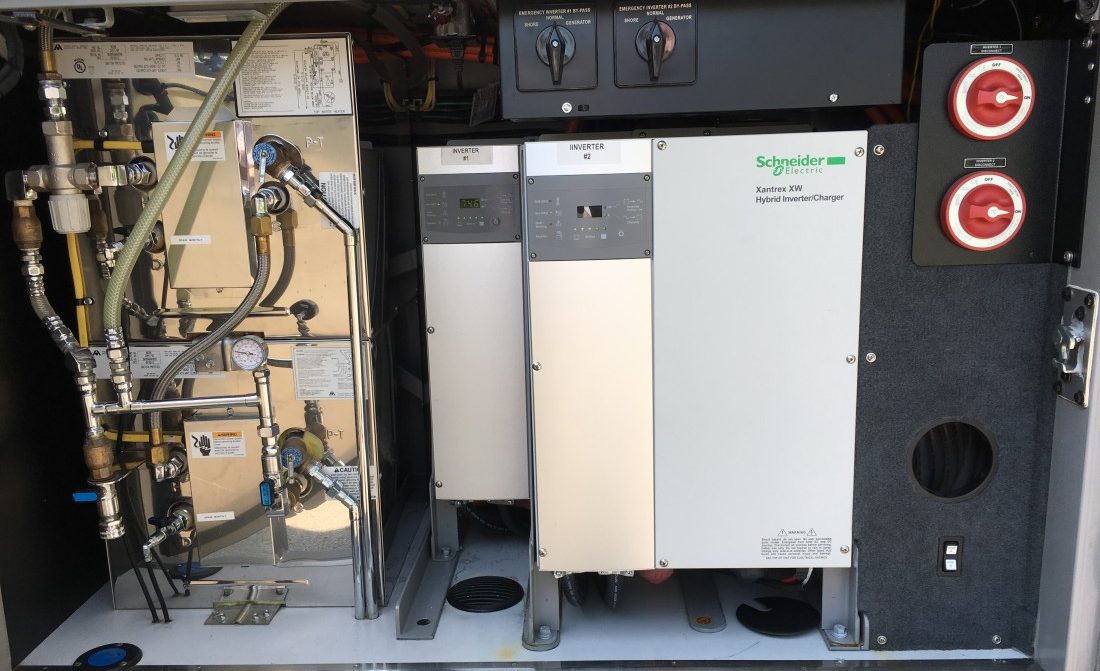
Inverter Bay
Since you may be taking Friends who are new to motorhoming along during an evacuation, it’s wise to make sure they know which appliances can and cannot run while connected to shore power or when running on inverter or generator and running a test before you leave is your best bet.
Know The Path And Have A Plan
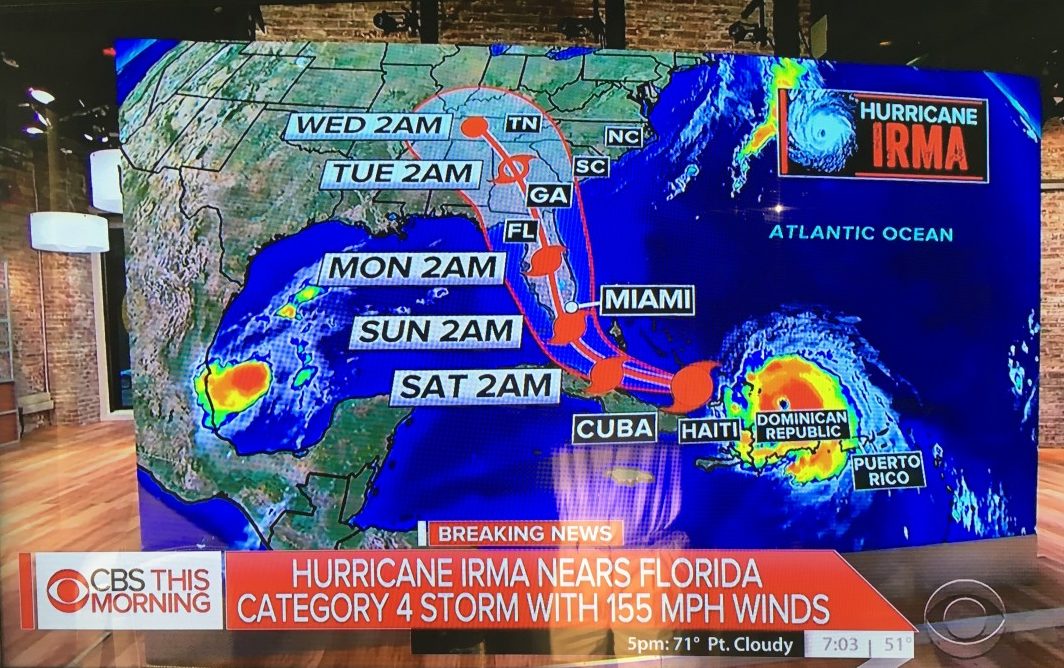
CBS News: Hurricane Irma Projected Path
Having an escape route can be tricky when dodging a moving storm and designating a passenger to be monitoring the path of the storm and the weather ahead is an important step. While the weather forecasters do their best to provide accurate information, when it comes to hurricanes, the paths can quickly change. In this day and age of phones and tablets, using weather apps to monitor current and future conditions is important during an evacuation.
When the storm clears, depending on the damage, your trip may be delayed due to road closures, so keep an eye on the news stations and check the news and transportation websites of the cities on your route.
Supplies
It’s a good rule of thumb to have at least three days of provisions onboard as during the evacuation process, many stores will be closed or will have run short of necessary items. This also pertains to the weight of the coach, and as mentioned previously, when calculating the proper tire pressure, be sure to have a couple of cases of water in the storage bay to learn what you can safely transport.
Medications
Packing items that are not easily purchased on the road is a necessity during an evacuation scenario. This means having an ample supply of prescription medications as well as baby formula and other items should be planned and packed prior to leaving home.
Pet Supplies, Vet Records and Pet GPS
For pets, make sure you have plenty of pet food and supplies. A friend provided a good piece of advice and that’s to only give the pet bottled water as it’s the best way to insure there’s no impurities that could cause illness. Also, having the pet’s medical records onboard is important should you need to visit a vet while traveling. In this day and age having a vet provide an electronic copy of the pet’s records is a simple task.
For Lucy the Dog, I use the Whistle 3 Pet Tracker. This is a two-piece system that includes a base station that utilizes a cell signal to know the current home location and a small GPS device that affixes to the collar. I’m on my third generation of this device and I can give it a very high recommendation. The app uses location services and text messaging alert you when your pet leaves the perimeter of the base station. In the case a pet is lot, a press of a button within the app displays an approximate location of the pet. The messaging service can also be setup to remind the owner when it’s time to recharge the battery.
The Whistle Pet Tracker sells for $70 and the monitoring fee is $10 per month. Lower monitoring prices are available with prepayment programs. Amazon Affiliate Link
CB Radio
If your motorhome is equipped with a CB radio, turn it on and monitor channels 19 and 9. Channel 19 is the channel you’ll find the majority of highway chatter and Channel 9 is for emergencies. This is a good way to obtain accurate traffic information for the area ahead.
Be Patient
Whether you’re escaping a massive hurricane or simply taking a family vacation, one factor I’ve learned to be of the utmost importance is patience. During an evacuation, tempers can flair and drivers can attempt unsafe maneuvers in order to get out of town faster than the flow of traffic allows. As motorhome owners, we need to take the high road and stay focused so that we’re not the cause of any situation that could cause road rage.
Summary
It’s important to note that if you find yourself driving towards the path of a severe weather system, it’s a good idea to find a Plan B and seek a safe place away out of harm’s way. While a coach may be designed to withstand 70mph highway speeds, it’s not what anyone would consider to be safe shelter during a potentially catastrophic weather event.
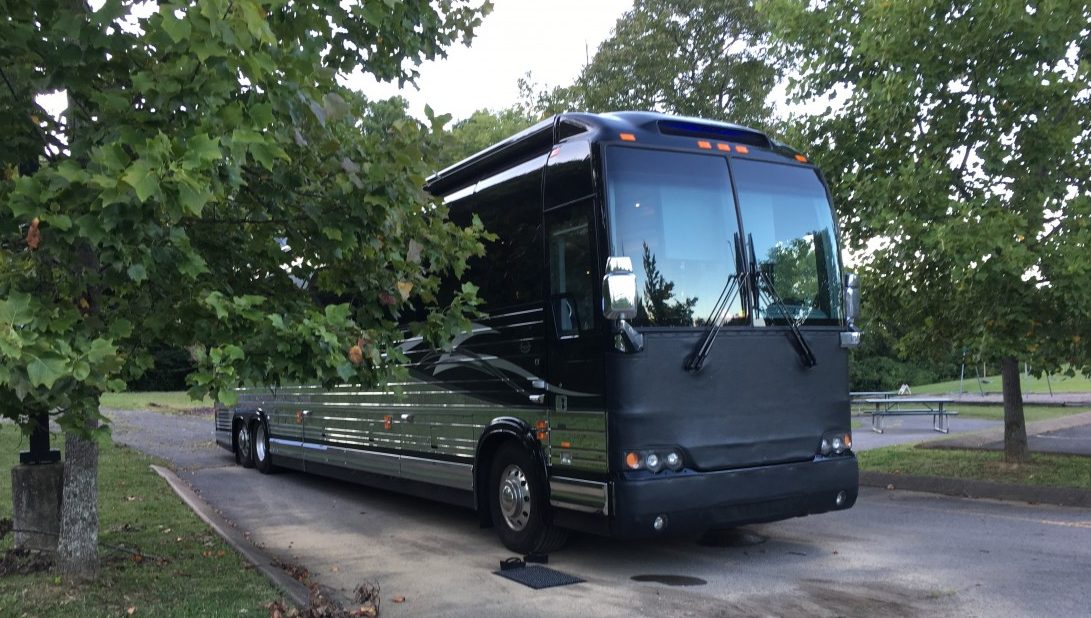
The Gadget Guru Hunkered Down In Tennessee
I’m currently located outside of the immediate path of Hurricane Irma and while I’m hoping for the best, I’ve planned for the worst and have with me the items that would be difficult or impossible to replace in the event the storm wreaks havoc on my home. If you’re in the path of the storm and whether or not you’re on the road or hunkered down at home, let’s remember that we’re all in this together and best thing we can do is to be there to assist others who may not have taken the proper precautions prior to the storms arrive.
Stay Safe!
Like, Share and Subscribe!
Related Stories:
The Importance of a Detailed Motorhome Checklist and an Update On Andy’s Coach Status
Prevost For Newbies: What You Need To Know About Featherlite Coaches
A Visit To Grand Lake RV & Golf Resort Proves To Be A Problematic Experience
Prevost For Newbies – Part 7: Weigh Each Tire To Find Proper RV Air Pressure

